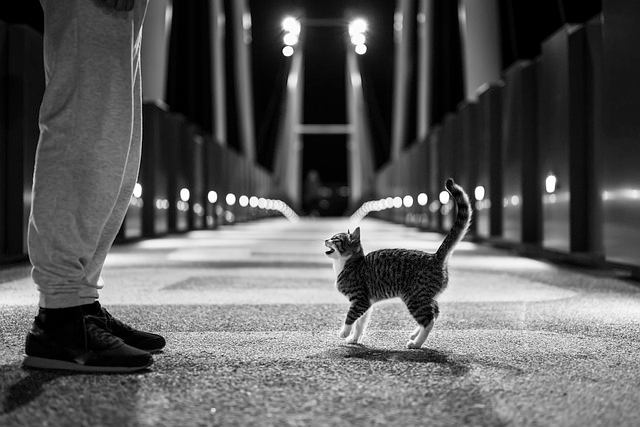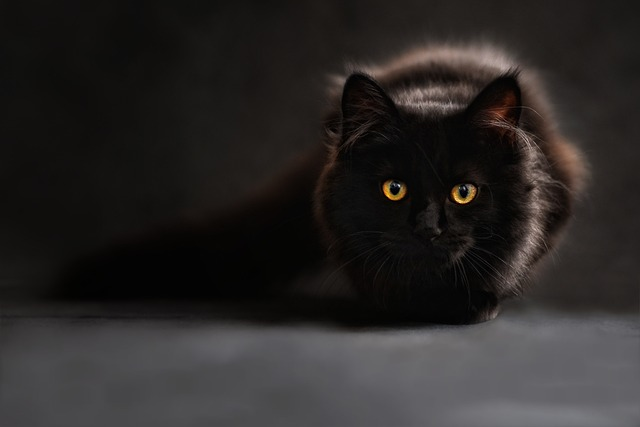Can Cats See In The Dark? As anyone who has ever spent time with a cat knows, these animals seem to have an uncanny ability to see in the dark. They can navigate their way through dimly lit rooms and even hunt for prey under the cover of night.
But how do they do it? Can cats actually see in complete darkness? The answer is both yes and no. While cats do have some impressive visual abilities that allow them to see in low light conditions, they are not completely blind at night. In this article, we will explore the fascinating world of feline vision and learn more about how cats are able to navigate in the dark.
What is Night Vision
Night vision is the ability to see in low light conditions, typically when there is not enough visible light for normal human vision. This is made possible by specialised cells in the eyes called rods and cones. Rods are responsible for detecting light levels and movement, while cones are responsible for colour perception.
In humans, we have a higher concentration of cones in our eyes which allows us to see colours more vividly during the day. However, we also have some rods that provide limited night vision capabilities. Cats, on the other hand, have a much higher concentration of rods compared to humans which gives them superior night vision abilities.
Plus, cats have a special reflective layer in their eyes called the tapetum lucidum. This layer reflects light back into the eye, giving them another chance to detect and process low levels of light. This is why you may notice your cat’s eyes glowing at night when a light source hits them.
Can Cats See in Complete Darkness
While cats do have excellent night vision, they are not able to see in complete darkness. Without any light at all, even their highly developed eyes cannot pick up visual information. However, due to their superior rod cells and reflective tapetum lucidum layer, cats can see with only one-sixth the amount of light that humans require.
This means that while we may struggle to see anything in a dimly lit room, cats are still able to navigate and distinguish objects with ease. This is especially useful for nocturnal predators like cats who rely on hunting during the night.
It’s also important to note that just because a cat can see better than us in low light conditions doesn’t mean they have perfect vision. Their visual abilities are still limited, and they may not be able to see details or colours as clearly at night.
How Cats Use Their Night Vision

Cats use their night vision for a variety of purposes, from hunting to navigating their surroundings. Their superior ability to see in low light conditions allows them to hunt prey that may be active at night, such as mice or birds.
In addition, cats are known for being curious explorers and can often be found wandering around the house at night. Their excellent night vision helps them avoid obstacles and allows them to navigate unfamiliar environments with ease.
But perhaps most impressively, cats are able to use their night vision for communication. They have a special reflective layer in their eyes that allows them to communicate with other cats through eye contact even in the dark. This is especially important for feral cats who rely on non-verbal cues to communicate with other members of their group.
Does Age or Breed Affect a Cat’s Night Vision
As with most physical abilities, age and breed can play a role in a cat’s night vision. Kittens are born with limited vision but their eyes develop quickly over the first few months of life, allowing them to see better in low light conditions.
Certain breeds of cats are also known for having better night vision than others. For example, Siamese cats have been found to have more rods and cones in their eyes compared to other breeds, giving them superior night vision abilities.
However, it’s important to note that individual variations within each breed can also affect a cat’s night vision. Some cats may simply have better visual abilities than others regardless of their breed. Additionally, older cats may experience a decline in their night vision as they age, just like humans.
Does a Cat’s Eye Colour Affect Their Night Vision
Eye colour does not have a direct impact on a cat’s night vision. However, cats with lighter coloured eyes may appear to have better night vision as their pupils dilate more easily, allowing more light into their eyes.
On the other hand, cats with darker coloured eyes may have more difficulty seeing in low light conditions due to the reduced amount of light that can enter their eyes. This is why some breeds with blue or green eyes may seem to have better night vision than breeds with brown or black eyes.
However, it’s important to note that the difference in eye colour does not necessarily mean one cat has superior night vision over another. There are various factors at play, such as the number of rods and cones in their eyes and the reflective layer of the tapetum lucidum.
Why Cats are Better at Seeing in the Dark than Humans
Cats’ superior night vision capabilities can be attributed to their evolutionary history. As nocturnal predators, cats have adapted over time to have heightened senses and specialised eyes that allow them to hunt effectively during the night.
Additionally, cats’ sensitive whiskers also play a role in their ability to navigate and sense their surroundings. These specialised hairs can detect changes in air currents and help cats determine the location of objects even when it’s too dark for them to see clearly.
Moreover, humans rely heavily on artificial lighting and technology while cats have evolved to thrive in natural settings with minimal light sources. This means that while our eyes may struggle to adjust to low light conditions, cats are able to see and function perfectly well in the dark.
Plus, cats have a natural instinct to hunt and explore at night. Their excellent night vision gives them a competitive advantage over their prey and allows them to thrive in their environment. And as pet owners, we can appreciate and admire this ability in our feline friends.
Is It Possible to Improve a Cat’s Night Vision
Unfortunately, there is no way to improve a cat’s night vision beyond what they are naturally born with. Just like humans, cats have a certain level of visual abilities that cannot be altered.
However, proper nutrition and regular eye check-ups can help maintain a cat’s already excellent night vision. Providing them with high-quality food containing essential nutrients such as taurine can support their overall eye health and function.
Additionally, keeping your cat indoors at night can protect their eyes from potential hazards such as bright headlights or reflective surfaces that may cause discomfort or harm.
Ultimately, it’s important to appreciate and respect a cat’s natural abilities, including their night vision. It’s what makes them unique and fascinating creatures that we are lucky to have as companions in our lives.
Mistakes to Avoid When Caring for a Cat’s Night Vision

When it comes to caring for a cat’s night vision, there are a few mistakes that pet owners should be aware of. Here are some common ones to avoid:
- Not providing proper nutrition: as mentioned before, essential nutrients such as taurine are crucial for maintaining a cat’s eye health and night vision. Plus, feeding your cat a balanced and nutritious diet overall can improve their overall well-being.
- Not taking them for regular eye check-ups: cats, just like humans, need to have their eyes checked regularly by a veterinarian. This can help catch any potential issues early on and ensure they receive proper treatment if needed.
- Encouraging excessive screen time: while it may be cute to see our cats watching TV or playing games on our devices, too much screen time can actually harm their eyesight. The bright and flickering lights from screens can cause strain and discomfort for cats’ sensitive eyes.
By avoiding these mistakes and providing proper care and attention to our cats’ night vision, we can help ensure they maintain their natural abilities and live happy, healthy lives.
Choose Hotel For Cats For A Luxury And Hassle-Free Experience
If you are planning a trip and need to find a safe and comfortable place for your beloved cat, look no further than the Hotel for Cats. Our luxurious retreat offers top-notch amenities and personalised attention for your feline friend while you are away.
At the Hotel for Cats, we understand that comfort is key for our guests. That’s why we offer deluxe private suites, enrichment activities, custom bedding and furniture, TV entertainment, relaxation and climbing areas, all run by our caring vet. With various room options available, you can book the perfect stay for your cat at affordable rates, including discounts for longer stays.
During peak periods, we may adjust our minimum stay requirements to accommodate unscheduled gaps, but rest assured that once you have made a reservation, we will not offer lower prices for the same dates.
So Book online, call us, or come in and see our facilities today to give your cat the ultimate luxury boarding experience at Hotel For Cats. We can’t wait to welcome your feline friend!
FAQs
How good is cat vision in the dark?
Cat vision is particularly adapted to very low light conditions, allowing them to see with very good night vision. This ability is much better than that of humans and is crucial for their nocturnal behaviours, such as hunting.
Why can cats see well in dim light?
Cats can see well in dim light because their eyes have a high number of rod cells that are sensitive to low light levels. This makes their night vision similar to using night vision goggles, allowing them to detect movement in near darkness.
How do cats’ eyes function in bright light?
In bright light, cats’ eyes can adjust through the contraction of their pupils to narrow slits, which reduces the amount of light entering their eyes. This protects the sensitive retinas and helps maintain their sharp peripheral vision even in brightly lit conditions.
What is the role of peripheral vision in cats?
Peripheral vision in cats is highly developed, allowing them to see a wide area without having to move their heads. This wide field of view is beneficial for spotting predators and prey, enhancing their survival both during the night and in very low light environments.
Conclusion
In conclusion, cats’ night vision is a fascinating and unique aspect of their physiology. Their specialised eyes, combined with their natural instincts, allow them to navigate and thrive in low light conditions.
While we cannot improve a cat’s night vision beyond what they are naturally born with, proper nutrition and regular eye check-ups can help maintain their excellent visual abilities. As pet owners, it’s important to provide our feline friends with the care and attention they need to keep their night vision intact.
And when it comes to travel or time away from home, choosing a luxury hotel for cats like Hotel for Cats can ensure our furry companions are well taken care of and have a comfortable stay while we’re away.
